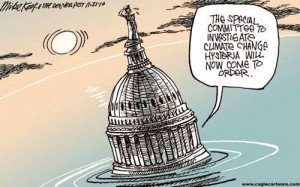 Daniel Gilbert, a professor of psychology at Harvard, has been wrestling with the question of why we aren't rallying our collective power to mitigate climate change. In a recent Pop Tech lecture, Gilbert digs into the evolution of the human brain for some possible answers. "Global warming is, by its very nature, a threat, but it is a deadly threat only because it fails to trigger the brain's alarm," says Gilbert. Climate change fails to garner a response because it lacks four features that the human brain has evolved to regard as serious threats. One is human agency. There is no conspicuous evil doer specifically plotting against us here in the ways our brains are designed to fear and repulse. There is no Hitler or Osama bin Laden to face off against in the gathering storm clouds, wildfires and floods. Second, global warming doesn't stir moral outrage in the way that the torture of animals or the burning of a flag instinctively do. It doesn't trigger that in-your-face emotional aversion that is guaranteed to garner a response. Third, global warming's threat doesn't feel immediate in the way a gun pointed at our head does, or an army of "infidels at the gate" would. It is easy to keep it held at an abstract distance. Fourth, the impacts of climate change are happening too slowly for the human brain to recognize as an immediate threat. We are that frog in the slowly boiling pot of water that can't detect the increasing temperature until it is too late.
Gilbert says,
Daniel Gilbert, a professor of psychology at Harvard, has been wrestling with the question of why we aren't rallying our collective power to mitigate climate change. In a recent Pop Tech lecture, Gilbert digs into the evolution of the human brain for some possible answers. "Global warming is, by its very nature, a threat, but it is a deadly threat only because it fails to trigger the brain's alarm," says Gilbert. Climate change fails to garner a response because it lacks four features that the human brain has evolved to regard as serious threats. One is human agency. There is no conspicuous evil doer specifically plotting against us here in the ways our brains are designed to fear and repulse. There is no Hitler or Osama bin Laden to face off against in the gathering storm clouds, wildfires and floods. Second, global warming doesn't stir moral outrage in the way that the torture of animals or the burning of a flag instinctively do. It doesn't trigger that in-your-face emotional aversion that is guaranteed to garner a response. Third, global warming's threat doesn't feel immediate in the way a gun pointed at our head does, or an army of "infidels at the gate" would. It is easy to keep it held at an abstract distance. Fourth, the impacts of climate change are happening too slowly for the human brain to recognize as an immediate threat. We are that frog in the slowly boiling pot of water that can't detect the increasing temperature until it is too late.
Gilbert says,
"We are perfectly designed, beautifully engineered by evolution, to respond to threats that are painful, that is, to evil people who suddenly threaten our immediate well being. When we're confronted by threats like this, we respond with crushing force, firm resolve, exactly as our ancestors would have. But global warming is a threat that pushes none of our buttons, and that's why we won't relinquish our Hummers for the sake of the polar bears. . . It leaves us sleeping in a burning bed. It remains to be seen whether we can learn to rouse ourselves to battle an impersonal, slow and quiet enemy that is indeed more dangerous than any our ancestors ever imagined."
Gilbert doesn't offer any antidotes to this evolutionary quandary. Yet simply continuing to sleep in a burning bed because we don't know what else to do is not a very satisfying response, once we've acknowledged that the problem is real, and the consequences of inaction are unacceptable. In my experience the key to unlocking that inner resolve is the power of personal choice, deployed one action at a time, especially when these actions bring us into greater physical health (like walking or riding a bike to the store for bread instead of driving), or bring us into a greater sense of local community (like having tea with a close neighbor rather than spending another hour on Facebook).
It is helpful to remember that "the climate isn't changing." "We are changing the climate." Our actions - yours and mine - are the root of this crisis. Only our actions in response, one person and one choice at a time, hold any prospect of meeting the challenge. Our actions of choice may be political, they may be social, they may be technological, they may be physical. Paying attention to how and what we eat, and why, matters hugely here. Paying attention to how we travel, how far, and why, matters hugely. Each action matters, and each action that moves us toward greater alignment with our values also moves the species a small tick toward positive evolutionary adaptation. The best antidote to powerlessness and despair is to do SOMETHING every day that is within our power to do, beginning now. The opportunities abound. What is the first new action YOU will take that has as its motivation the wholeness and healing you desire for yourself and the world?
